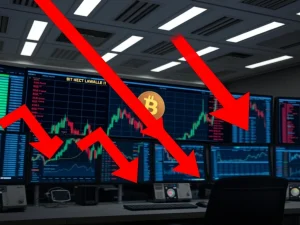Urgent Warning: Bitcoin’s 24/7 Liquidity Becomes a Double-Edged Sword in Market Turmoil

Bitcoin, the poster child of the crypto revolution, is celebrated for its always-on, 24/7 trading nature. But in today’s volatile global markets, is this constant liquidity a blessing or a curse? Recent market events suggest a more complex reality. While traditional markets take weekends off, the crypto market, especially Bitcoin liquidity, never sleeps. This always-available nature, often touted as an advantage, can transform into a vulnerability during times of global economic uncertainty. Let’s dive into why Bitcoin’s 24/7 trading might be a double-edged sword, particularly when market turmoil strikes.
The Allure of 24/7 Bitcoin Trading: Freedom or Trap?
Imagine a world where markets are always open. No more waiting for Monday morning to react to breaking news. This is the promise of Bitcoin’s 24/7 trading. Unlike traditional assets like stocks, which adhere to exchange hours, Bitcoin operates on a decentralized blockchain network, allowing trading around the clock, every day of the year. This accessibility has been a major draw for investors worldwide, offering:
- Uninterrupted Access: Trade Bitcoin whenever you want, regardless of time zones or holidays.
- Global Participation: Investors from anywhere in the world can participate in the Bitcoin market at any time.
- Immediate Reaction to News: The market can respond instantly to global events, without waiting for market open.
However, this constant availability also presents unique challenges, especially when global market turmoil hits.
Weekend Wipeouts: Why Bitcoin Feels the Heat When Traditional Markets Close
Recent market analysis reveals a concerning trend: significant Bitcoin price drops often occur over weekends. Why is this happening? The answer lies in Bitcoin’s unique position as a 24/7 tradable asset during periods when most other major markets are closed.
As Lucas Outumuro from IntoTheBlock points out, when panic selling grips traditional markets, investors have limited options on weekends. Stocks, bonds, and many commodities are unavailable for trading. What is open? The crypto market, and notably, Bitcoin due to its significant Bitcoin liquidity.
Consider this scenario:
- Global Market Shock: A major event triggers fear in global markets (e.g., trade tariff announcements, geopolitical instability).
- Traditional Market Sell-off: During weekday trading, investors react by selling stocks and other traditional assets.
- Weekend Liquidity Squeeze: When markets close for the weekend, the ability to de-risk is limited.
- Bitcoin as the Escape Hatch: Bitcoin, with its 24/7 trading, becomes the primary, and sometimes only, readily available asset to sell for those looking to reduce risk exposure quickly.
- Weekend Price Drop: This concentrated selling pressure on Bitcoin during weekends can lead to sharp price corrections, even if the initial market shock wasn’t directly related to crypto.
This dynamic was evident after a recent record-breaking drop in the S&P 500. While Bitcoin initially seemed to hold its ground, a significant plunge occurred over the following weekend. This illustrates the “double-edged sword” effect: Bitcoin liquidity, normally a strength, becomes a focal point for selling pressure during market turmoil when traditional avenues are shut.
Correlation Conundrum: Is Bitcoin Really Decoupling?
There was hope that Bitcoin might be decoupling from traditional markets, acting as a safe haven during economic downturns. Early data suggested a potential divergence. However, the recent weekend sell-off indicates a more complex crypto market correlation with traditional finance than some hoped for.
While Bitcoin might show periods of independent movement, particularly during calmer market conditions where its 24/7 trading can facilitate price rallies, the underlying crypto market correlation with broader economic sentiment remains significant, especially during panic events.
As Outumuro noted, the initial “decoupling” observed when the US stock market faced a substantial drop proved to be temporary. When wider market panic intensified due to escalating trade war concerns, Bitcoin ultimately succumbed to the pressure, highlighting that:
- Perceived Decoupling Can Be Fleeting: Short-term divergences from traditional market trends don’t guarantee long-term independence.
- Fear Transcends Asset Classes: In moments of extreme fear and uncertainty, correlations across markets tend to increase.
- Bitcoin Remains Part of the Global Financial Ecosystem: Despite its decentralized nature, Bitcoin is not immune to the gravitational pull of global economic sentiment and traditional market movements.
Leverage Amplifies Weekend Volatility: The Adam Back Perspective
Adding fuel to the fire of weekend volatility is the issue of leverage in the Bitcoin market. Adam Back, CEO of Blockstream, highlights that many Bitcoin investors are “all in” and overleveraged. This situation, combined with Bitcoin’s 24/7 trading, creates a recipe for potential flash crashes, particularly on weekends when trading volume is typically lower.
Back explains that lower weekend volume exacerbates the risk of rapid price drops or “flash dips.” When leveraged positions are liquidated during periods of panic, the effect can be amplified in the thin weekend markets, contributing to steeper weekend sell-offs.
Navigating the 24/7 Crypto Seas: Strategies for Investors
So, what does this mean for crypto investors? Is Bitcoin’s 24/7 liquidity inherently bad? Not necessarily. It’s about understanding and navigating the nuances. Here are some actionable insights:
- Acknowledge the Weekend Effect: Be aware that weekends can be periods of increased volatility for Bitcoin, especially during global economic uncertainty.
- Manage Leverage Prudently: High leverage in volatile crypto market correlation scenarios can be exceptionally risky. Consider reducing leverage, especially heading into weekends.
- Diversification Matters: While Bitcoin is a leading crypto asset, diversifying your portfolio across different asset classes can help mitigate risk.
- Stay Informed About Global Events: Keep abreast of global economic and geopolitical developments that could trigger market turmoil and impact crypto markets.
- Long-Term Perspective: Remember that short-term volatility is inherent in crypto markets. Maintain a long-term investment perspective and avoid panic selling during temporary dips.
The Future of Bitcoin Liquidity: Balancing Act Required
Bitcoin liquidity and 24/7 trading are fundamental aspects of the cryptocurrency market. While these features offer undeniable advantages in terms of accessibility and market responsiveness, they also present unique challenges during times of global market turmoil.
The key takeaway is not to view Bitcoin’s 24/7 trading as purely positive or negative. Instead, it’s crucial to understand its implications and adapt investment strategies accordingly. As the crypto market matures and potentially decouples further from traditional finance, the dynamics of weekend sell-offs and crypto market correlation may evolve. For now, informed investors must recognize this double-edged sword and navigate the 24/7 crypto seas with caution and strategic foresight.






